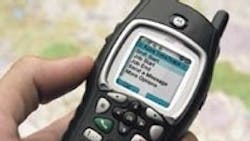When Vehicles Become Mobile Offices
By Lee Driscoll
The Xora system displays job start and stop times.
myServiceForce.com provides handheld devices and field service.
GPS tracking enables business owners and managers to know vehicle locations, which helps improve customer service, and saves on administrative time, effort, and money.
A joint technology solution from Sprint/Nextel and Xora, Inc., Mountain View, CA, uses a standard GPS-enabled cell phone.
"Once workers know the company has visibility of exactly what's happening in the field, workers tend to have a greater sense of accountability over their work, and generally, you see productivity improvements," says Mike Berger, Xora's director of marketing.
Owen Mueller, chief financial officer of Pete Miller, Inc., a residential and commercial HVAC contractor based in Marion, OH, estimates the Xora system saves 10- to 15-minutes in a technician's day.
A "location module" in the Xora Time Track system allows managers to learn the location of a given team of technicians. All they do is log on to the Xora website and view maps that show the status of workers in real time. A "Flex Fields" feature enables technicians to collect or send data from the job site, such as product bar codes or product ordering information.
Xora recently integrated Desco's Electronic Service Control into its program to handle billing, invoicing, inventory management, and customer data bases.
Internet-based Solution
Pro Mechanical Service, a $4 million industrial/commercial service and Design/Build HVAC company based in Riverside, CA, uses a hosted, mobile field service solution from myServiceForce.com, West Chester, PA, to reduce overhead and streamline administrative and dispatching activity. The myServiceForce.com website allows Pro Mechanical's technicians to print bills on site, post invoices online immediately, and update customer information in real time. President Tom Willison says the company has reduced annual office costs by $40,000, and billing cycles are reduced to three days. Accounts receivable are down to 32 days. Customers can view project information anytime. "They can dial in and obtain equipment history, work orders, and historical information," Willison says. "My technicians have also become very comfortable with the system. Now, they don't have to call other technicians to learn the history of a project, because the entire project history is included as part of the dispatch information."
Get There On Time, Every Time
The SkyTel FleetHawk combines GPS technology with SkyTel's wireless network and the Internet. It allow managers to view the location of the entire fleet from a desktop, obtain immediate notification when a vehicle enters a restricted location or exceeds safe speed limits, determine which vehicle is nearest to the next job site, or access a detailed route history for all vehicles.
Charles Tapley, information systems manager for Heritage Heating and Plumbing, Stoneham, MA, selected the FleetHawk GPS fleet management system to address tardiness.
"If you give a customer an 8 a.m.-to-10 a.m. timeframe, there's no excuse for not being there at 8 a.m.," Tapley says. "That first call also sets the tone for your whole day. If you're late for the first call, you're late for the rest of the day. Knowing when trucks arrive at the job sites helps to improve our customer service. Now, everybody is focused on getting there on time, every time."
FleetHawk's automatic reporting helped Heritage's managers find where time was being lost. "We picked up 15 minutes here, a half-hour there, extended lunch breaks, things like that. In the end, we figure we probably paid for the system in the first year just in tracking down that time," says Tapley.
A Word About Fleet Management
Poudre Valley Air, Fort Collins, CO, realized driving vehicles more than 150,000 miles was costing them in fuel, maintenance, and insurance, so the company enlisted in a 4-year, 80,000-mile cycling program through Enterprise Fleet Management. Maintenance expenses dropped by more than 50%, vehicle downtime was virtually nonexistent, and insurance and registration fees on spare vehicles were reduced.
"Our cycling program with Enterprise looks at things like future trends, the current used vehicle market, warranties, mileage, and the potential wear and tear our business will inflict on each vehicle. Taking a detailed approach ensures we're not wasting fleet dollars," Weisser says.
